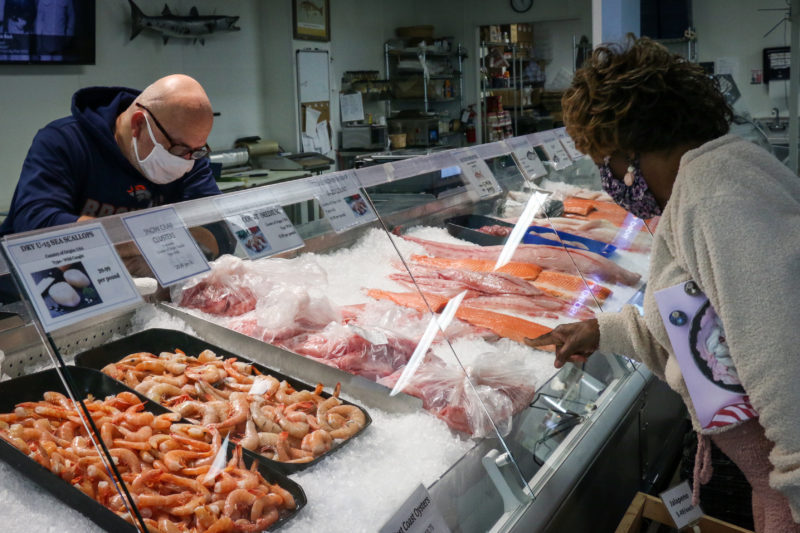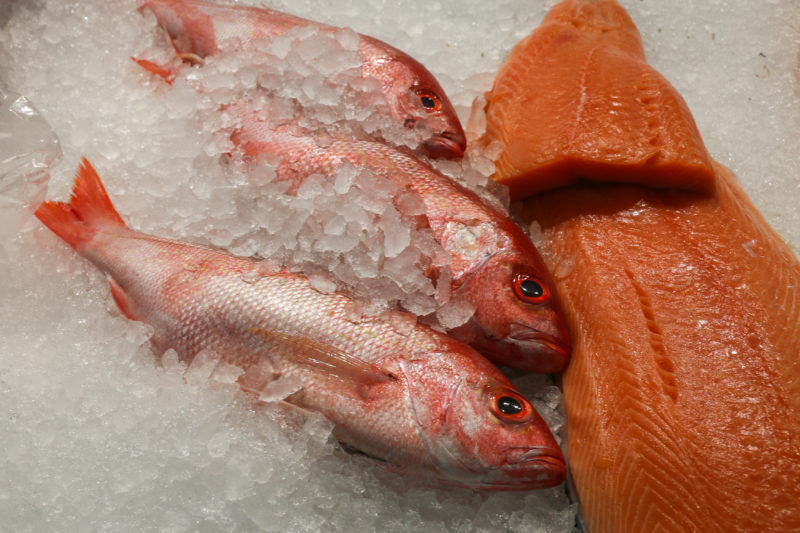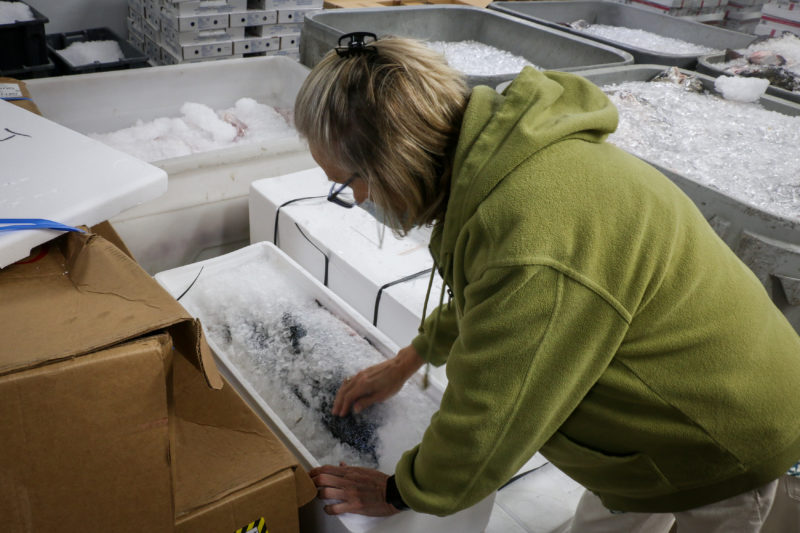200 Chefs Demand More U.S. Action to Stop Illegal Fishing
By Samuel Stark
Reporting Texas

Leanner Burnell, left, purchases Black Drum flanks from Sal Salerno at Quality Seafood Market in Austin on Dec. 1, 2021. Burnell has been buying fish from Quality Seafood Market since she was a child, she said, while Salerno had just started his new job, saying he’s “as fresh as the fish in the display.” Samuel Stark/Reporting Texas
Nathan Lyon remembers fishing with his grandparents on the Chesapeake Bay and the Outer Banks of North Carolina. That childhood pastime turned into a lifelong penchant for ethically sourced seafood for Lyon, now a 50-year-old celebrity chef in Austin known for television appearances on the Food Network and Discovery Health.
“I had a hands-on experience with the health of the ocean and what it means to not overfish. I’d speak with a local fisherman about things that were concerning,” Lyon said. “I am nothing more than a product of my environment. I’m just very lucky to be able to have that experience.”
Lyon was one of 200 chefs to sign a letter to Congress demanding the federal government do more to address illegal, unreported and unregulated fishing — or IUU fishing, as it is known. Currently 20% to 32% of all wild-caught fish imported into the U.S. is considered to be a product of IUU fishing.
IUU fishing occurs in oceans around the world and threatens the livelihood of ethical fishermen, kills marine life, destroys threatened habitats and is often linked to human rights abuses.
In the letter, the chefs expressed their support for House Resolution 3075, introduced by Reps. Jared Huffman, D-Calif., and Garret Graves, R-La., in May. The House Natural Resources Committee passed the resolution by voice vote in October.
“(The bill) provides a set of requirements that would improve the traceability and transparency of the seafood supply chain,” said Beth Lowell, deputy vice president for U.S. campaigns at the ocean advocacy group Oceana.

Wild caught Queen Snappers lie in the ice of the chilled fish display at Quality Seafood Market in Austin on Dec. 1, 2021. The Queen Snapper is similar in appearance and related to the Red Snapper, a fish often targeted in illegal, unregulated and unreported fishing. Samuel Stark/Reporting Texas
Oceana joined two other advocacy groups — the Wildlife Fund and the National Resources Defense Council — to organize the chefs’ petition.
“And as far as chefs that have a lot of buying power, we really pay attention. Which is why I signed on asking Congress to do exactly what we asked them to,” Lyon said.
The National Oceanic and Atmospheric Administration, NOAA, a federal regulatory agency, cited six countries for IUU fishing between 2018 and 2020. One example affecting U.S. waters is happening off of the Texas coastline in the Gulf of Mexico.
“In Texas, we see illegal fishing occur on the majority of our border waters. We have, of course, the Gulf of Mexico, (and) also the Rio Grande River, Amistad Lake and Falcon Lake,” said Leslie Casterline, Assistant Commander Game Warden for the Texas Parks and Wildlife Department.
Currently the area of largest concern is the Gulf, where vessels from Mexico — referred to as “lanchas,” the Spanish word for motorboats — enter U.S. waters illegally. red snapper and shark are their most desired catches, Casterline said.
To catch these fish, illegal fishermen use destructive methods that have been banned in the U.S., such as gillnets and long lines. Gillnets are designed to allow a fish to get its head through the mesh net but not the rest of its body. As the fish attempts to free itself, it becomes more entangled.
“You’re not allowed to possess a gillnet within 500 yards of coastal water,” Casterline said.
Officials often see sea turtles and marine mammals such as dolphins tangled up in these nets. The Texas Parks and WildLife Department reports that it has seized 32.23 miles of gillnets and long lines over the past two years.
Lt. Cmdr. Daniel Ippolito of the U.S. Coast Guard at South Padre Island said it has been intercepting illegal vessels since the late 1980s — and has broken records for lancha interdictions every year for the last three years.
“Some of that is skewed (because of) improved capabilities and working with our partners. Some of that seems to be the increase in illegal fishing in the Gulf,” Ippolito said.
The U.S. has stringent guidelines regulating how much and what you can and cannot catch.

Carol Huntsberger, owner of the Quality Seafood Market, brushes ice off a frozen Black Drum in the freezer section of the market on Dec. 1, 2021, in Austin. Samuel Stark/Reporting Texas
Fish like red drum and spotted seatrout are commercially protected in Texas, meaning they cannot legally be caught and sold. Other target fish, such as red snapper and shark, are not commercially protected but are still being taken in violation of Texas regulations, Casterline said.
Because of these guidelines, the red snapper population in Texas waters is plentiful. The red snapper can also be found in Mexican waters but are scarce due to overfishing, Ippolito said.
“It’s overfished in their area, and we have a lot of good fish over here. So, I think (they’re) taking advantage of our good stewardship when it comes to our fish population.” Ippolito said.
Currently the Coast Guard on South Padre Island cannot do much to punish the illegal actors except to take the boats, catch and send them back to Mexico. Ippolito said they end up apprehending the same lanchas frequently.
“The average from NOAA was six times for any lancha who was detained. We’ve had people over 30 times detained,” Ippolito said.
If HR 3075 passes, it will expand federal ability to work with countries engaging in IUU fishing like Mexico. For example, it would deny port privileges to fishermen who violate U.S. guidelines.
“Chefs have supported measures like this before,” Lowell said. “In fact, hundreds of chefs supported seafood traceability under President Obama. And now, once again, they are raising their voices to demand safe, legally caught, responsibly sourced, and honestly labeled seafood.”
While a seafood buyer cannot always be confident in knowing if a wild caught fish was acquired legally, Lyon advises his audience to vote with their dollar by purchasing sustainably farmed fish or fish cleared by seafoodwatch.org, a resource by the Monterey Bay Aquarium that enumerates which fish to avoid.
“My buying power (is) through the people that watch my television programs, or that have my cookbook, or whatever the case may be, if I can have 10% of those people, ask the right questions. … It makes a huge difference,” Lyon said.